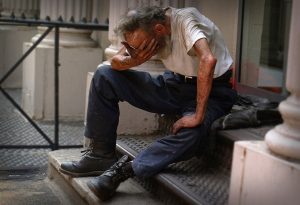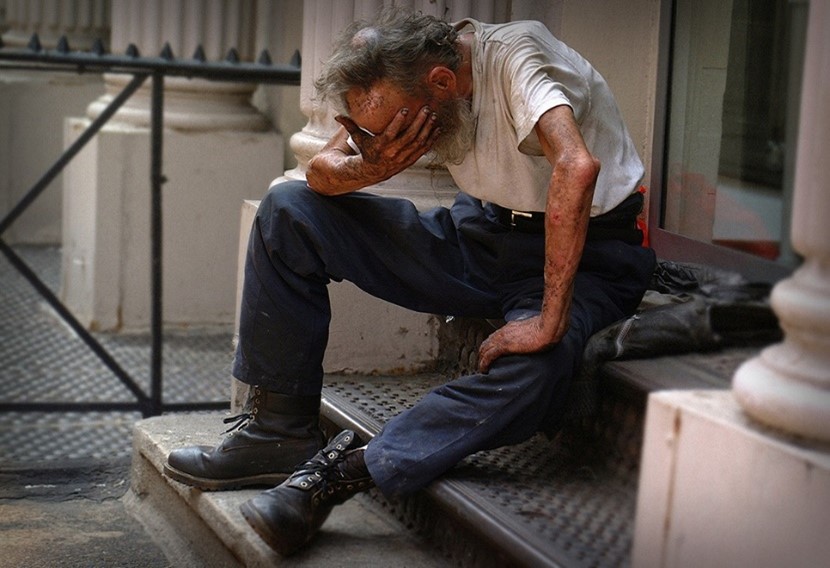Elderly Americans are living in poverty and at risk of losing their homes
Authored By: Charmaine Nyman, staff editor

Although the poverty rate among Americans aged 65 or older has declined by almost 70% in the past five decades, over 15 million Americans aged 65 or older are currently living at or below 200% of the federal poverty level with their income averaging $25,760 per year for a single person in 2021.[1] People aged 80 or older have a higher rate of poverty than other elderly Americans.[2] As of 2016, elderly woman received approximately $9,900 less annual in retirement income than their male counterparts due to lower lifetime earnings, occupational segregation into lower wage work, and time taken off to raise children.[3] Woman of color fare even worse.[4]
Ninety-seven percent of the elderly either receive social security or will receive it during their lifetime, and most retirees rely on Social Security for at least half their income.[5] In 2021, the average nationwide monthly payments will total $18,516, just a $20 increase from 2020 payments.[6] The elderly in Virginia fare better than most states with the average annual benefit in 2021 being $19,185, putting Virginia at the 14th highest in social security payments.[7] Those in Virginia are experiencing a $246.32 increase from their 2020-year income. While social security is adjusted every year for inflation, social security adjustment does not necessarily reflect the cost-of-living standards. Although the monthly payments are increasing, costs of living are increasing as well, and the elderly are struggling with rising housing and health care bills, diminished savings, and the inability to make ends meet.[8] For instance, although the Social Security payments have increased in 2021, the Medicare monthly premium is also increasing by $46.80. Therefore, those receiving social security in Virginia are only receiving $199.52 more in 2021 than they were in 2020. From the remaining $199.52 per year that elderly are receiving, they must take into account rising gas prices, heating fuel, medication costs, doctors’ appointments, and rising property taxes.
Because elderly Americans rely on fixed incomes such as social security benefits and pension benefits, many do not have sufficient liquid assets to afford property taxes. Because home values have increased so significantly over the years, tax bills have become almost exorbitant to then elderly when they are living on fixed incomes.[9] Due to concerns of the public and politicians that elderly homeowners living on fixed incomes will be driven out of their homes because they can no longer afford increasing property taxes, many states are looking for new ways of providing property tax relief to elderly homeowners.[10]
Property tax guidelines vary considerably from state to state, and each state has specific rules for who can take advantage of an exemption.[11] Most states have homestead exemption and credit programs in place for seniors to exempt a certain amount of a home’s value from taxation.[12] However, most states are not proactive in getting seniors the help they need.[13] “The state, county or city agency that collects your property taxes doesn’t tell you that you qualify for an exemption . . . You have to find out for yourself whether you qualify.”[14]
In Virginia, the legislature has passed laws that require that the Treasurer of any county, city or town to enclose written notice within each real estate tax bill of the terms and conditions of any local real estate tax exemptions or deferral programs established in that jurisdiction based on §58.1-3210.[15] Virginia Code §58.1 – 3210 specifies that certain eligible persons may receive an exemption or deferral of property taxes if they are elderly or handicapped, but only if the governing body of the county, city or town has passed an ordinance to provide such exemption.[16] If a county, city, or town passes such an ordinance to provide an exemption, the ordinance generally only provides an exemption from, or deferral of, only a portion of the property tax.[17] This portion of tax represents the increase in tax liability from the year the taxpayer reached the age of 65, or the year that the ordinance became effective, whichever is later.[18]
While these property tax exemptions and referrals do aid the elderly in making property taxes more affordable, there are still large discrepancies between the annual incomes of elderly people and the current cost of living. With the booming housing market, property values are increasing, and in turn property taxes increase.[19] Many elderly people live on fixed incomes that are often times not able to support the rising cost of property taxes. Although states offer programs to alleviate some of this cost, often times with the cost of living increasing, elderlies fixed income cannot support the rising cost of living coupled with rising property taxes, leaving a large portion of our elderly living in poverty, and at risk of losing their homes. Property taxes are just one piece of why so many elderly Americans live in poverty. The country needs to reevaluate social security payments, and the rising cost of Medicaid which is taken out from these social security payments before they even reach the intended recipient. A general inflation increase to social security benefits is not enough to cover the rising costs of living, especially in the face of a potential $15 an hour increase to minimum wage.
[1] Get the Facts on Economic Security for Seniors, Nat’l Councs on Aging (Mar. 1, 2021) https://www.ncoa.org/article/get-the-facts-on-economic-security-for-seniors
[2] Zhe Li, et al., Cong. Research Serv., R45791, Poverty Among Americans Aged 65 and Older 1 (2019).
[3] Id.
[4] Id.
[5] Policy Basics: Top Ten Facts about Social Security, Ctr on Budget and Pol’y Priorities (updated Aug. 13, 2020) https://www.cbpp.org/research/social-security/top-ten-facts-about-social-security#:~:text=Almost%20all%20workers%20participate%20in,to%20Social%20Security%20Administration%20estimates.
[6] Emily Brandon, Social Security Changes Coming in 2021, U.S. News & World Report (Oct. 13, 2020) https://money.usnews.com/money/retirement/articles/social-security-changes-coming-next-year#:~:text=The%20average%20Social%20Security%20benefit,%242%2C596%20per%20month%20in%202021.
[7] Id.
[8] Supra note 1
[9] Louise Norris, How are Medicare Benefits Changing for 2021? Medicareresources.org (Nov. 7, 2020) https://www.medicareresources.org/faqs/what-kind-of-medicare-benefit-changes-can-i-expect-this-year/.
[10] Hui Shan, Fed. Res. Board, 2008-50, Property Taxes and Elderly Mobility, (2008)
[11] Craig Berry, How to Claim your Senior Property Tax Exemption, The Mortgage Rep. (Apr. 15, 2020) https://themortgagereports.com/63473/how-to-claim-senior-property-tax-exemption#:~:text=You%20have%20to%20find%20out,tax%20deduction%20you%20qualify%20for.
[12] State Property Tax Freeze and Assessment Freeze Programs, NCLS (Dec. 31, 2012) https://www.ncsl.org/research/fiscal-policy/state-property-tax-freezes-and-assessment-freezes.aspx.
[13] Berry, supra note 11.
[14] Berry, supra note 11.
[15] Va. Code Ann. §58.1-3213.1 (2020).
[16] Va. Code Ann. §58.1-3210 (2020).
[17] Va. Code Ann. §58.1-3210 (2020).
[18] Id.
[19] Marco Santarelli, US Housing Market Forecast 2021: Will Sales or Prices Crash?, Norada Real Est. Inv. (Mar. 30, 2021) https://www.noradarealestate.com/blog/housing-market-predictions/.
[20] https://backpacksforthestreet.org/elderly-and-homeless-americas-next-housing-crisis/
